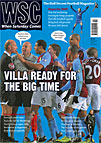 Down with el presidente! Revolution has come to Newell's Old Boys, in Che Guevara's home town. Joel Richards reports
Down with el presidente! Revolution has come to Newell's Old Boys, in Che Guevara's home town. Joel Richards reports
The city of Rosario’s most famous son would have been proud. The 14-year “dictatorship” of Eduardo López at Newell’s Old Boys came to an end in December. “At last,” bellowed opposition leader Guillermo Lorente upon hearing the news, “Newell’s belongs to its fans.” Che Guevara was a Rosario Central supporter, but he would not have begrudged fans of the rival team this victory.
Presidential elections are vital in the running of clubs in Argentina. Founded as sports clubs, to this day members are just as likely to use the club’s swimming pool, tennis courts or barbecue areas as they are watch the team play. In 2008, members at seven first division clubs went to the polls to decide their club’s president. Elections at Newell’s, however, were unexpected, and unprecedented.
López succeeded in cancelling elections in 1997, 2000 and 2004. A self-made businessman with allies in the courts, the media and at the FA, he enjoyed complete, unchecked control. During his presidency, he avoided punishment for illegal gambling, tax evasion, fraud and signing dishonoured cheques. Yet, as the opposition pointed out, Article 21 of Newell’s statutes requires “good conduct” of directors and that they may not face any legal proceedings.
Co-opting the barra brava (a hooligan group), López silenced the dissident voices. “Just the sight of the barra at matches was enough to put an end to the anti-López songs,” says Mónica Nizzardo, of the organisation Let’s Save Football. Such was the power of the barra that they owned a stake in the transfer rights of several players. As for López, he is wanted by the Argentine inland revenue for non-payment of tax on numerous transfers (including those of Gabriel Heinze and Maxi Rodríguez).
Not even the youth academy was safe. Leo Messi and Gabriel Batistuta, and as well as Heinze and Rodríguez, have emerged from the youth system, but under López families had to pay for their sons to play. María Rosa Fernández accused Sergio Almirón, the head of the youth academy and a 1986 World Cup winner, of wanting money to choose her son Alan. “When it came to picking the player who would be promoted to the reserves and the first-team squad, Almirón asked me for 40,000 pesos [£9,000].” She refused, and filed a complaint. Alan, a promising midfielder, was thrown out of the club after spending seven years at Newell’s. “I heard that the family of boy who took his place paid 80,000 pesos,” she adds.
Last May, the various supporters’ groups opposing López united under the umbrella group Movimiento Leproso, taking the club’s nickname – the Lepers. Guillermo Lorente, who lost the 1994 elections to López by 200 votes, would be their candidate. Marcelo Bielsa, the current Chile coach who guided Newell’s to titles in the early 1990s, backed the campaign, publishing an open letter days before the elections. “Through its conduct,” he wrote, “the current administration has made the commitment of the fans to search for a change increasingly important.”
López continued to receive support from the courts; a judge ruled that members must have paid the past four months of their fees to be able to vote – a prohibitively high fee for many supporters to find. So fewer than 6,000 (out of 25,000 members) voted, but 66 per cent opted for Lorente. “You have to understand what this means for us,” said Roberto Mensi, wiping back tears at hearing the result. “Rosario is a small city, everybody knows everybody. We’ve had threatening phone calls, the barra came to our houses to intimidate us, but at last that is over.”
The condition of the club Lorente inherited was worse than previously imagined. “Newell’s is like Kosovo,” said the new president. The barra had taken televisions, computers, furniture, even footballs and training equipment. There were no accounts, and the club did not even appear on the water or electricity boards’ books. The trophy room was vandalised, and even the statue of Isaac Newell, one of the pioneers of football in Argentina and whose son founded the club with his surname, was found broken on the floor. Of the 500,000 pesos paid in membership fees to vote, the new club treasurer found just 170,000. Players haven’t been paid in months, their contracts are nowhere to be found and there are even doubts about ownership of the stadium.
Yet the battle is over. López is finally out of the club. “The members at Newell’s voted for a restitution of ethics, transparency, democratic principles and institutional normality,” wrote the newspaper La Nación. How long the normalisation of the club’s administration will take to bring about, nobody knows. Yet the statue of Che Guevara standing two miles from the stadium continues to serve as inspiration. Hasta la victoria, siempre.
From WSC 264 February 2009